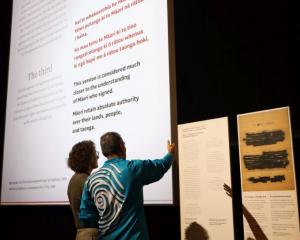
NewstalkZB's Soper tweeted a picture about 9.45am, apparently of police officers going through boxes of papers.
"Cops search our apartment in Wellington to find handwriting samples of Heather du Plessis-Allan to prove gun charges against her," said Soper.
Detective Senior Sergeant Andrew Saunders arrived at Soper's apartment this morning to present him with a search warrant.
The detective said it was being served to find handwriting samples of du Plessis-Allan.
Soper told the New Zealand Herald police had made contact yesterday to tell him a search warrant had been issued for the couple's apartment.
"You have to be joking," Soper said he responded. He told the officers he was going out that evening so wouldn't be available and asked if they could come this morning.
At 8am, three officers turned up to conduct the search, including the investigation head Detective Senior Sergeant Andrew Saunders. One of the three was believed to be a handwriting expert.
"They went through drawers, bedside cabinets."
Cops search our apartment in Wellington to find handwriting samples of @HDPA to prove gun charges against her. pic.twitter.com/ckLaA5AuzC
— Barry Soper (@barrysoper) November 30, 2015
Soper was surprised that police officers travelled from Auckland to search their Wellington apartment without first searching her Auckland apartment.
Asked how du Plessis-Allan had reacted to the police search, he said: "It's always worrying, these things. But the fact is that the story was done in the full knowledge that there could have been repercussions.
"But the police acknowledged immediately there was a problem, that people were able to buy guns online without a licence and pose as somebody else."
He added: "You would have thought that in the public interest, this was the story to do. She did it, and now unfortunately it would seem they're trying to make her suffer the consequences."
Soper said police appeared to be over-reacting, and he questioned whether they would have put in as much effort for a lower-profile case.
"I think the police here have been caught napping and publicity was given to it.
"They don't like the fact that they've been seen as not perhaps doing their job as well as they could have.
"Because it's a high public profile case now, and it's a way that they can get back at those who made them look a bit foolish."
An "extreme" move
The search of du Plessis Allan and Soper's home was an "extreme move" and would have to have been balanced against explicit safety checks in police policy, said barrister Felix Geiringer, the lawyer acting for investigative journalist Nicky Hager over a search warrant executed on his home.
Mr Geiringer said the rules for approving warrants against journalists were laid out in a specific procedure which stipulated personal sign-off being sought from a member of the police executive committee or a district commander.
He said it also required the approval of a judge when search warrants could normally be approved by senior court staff. The policy manual for executing search warrants on reporters was recognition issues of "particular sensitivity" existed when it came to media, he said.
Mr Geiringer said the sensitivity included maintaining public confidence in the freedom for media to gather information without the perception it could be seen as a rich source for police to mine. He said there was also important legal protection under the Evidence Act for reporters seeking protection of their sources.
"It does come across as heavy-handed. I'd be interested to know if they explored other methods of getting the information."
He said police "could have asked Barry or Heather directly", or approached Mediaworks.
He said the police investigation was over a month old and it was clear information relating to the apparent gun purchase would be sought. In the time since the investigation was launched, any suspect looking to destroy or interfere with evidence would have already done so - which meant a thorough search of the apartment for documentation relating to the case would be as useful as asking for it to be voluntarily produced.
Mr Geiringer said handwriting was something which could not be hidden - police could also have asked for du Plessis Allan to supply the information.
Story highlights loophole
Du Plessis-Allan is a presenter on TV3's Story current affairs programme. In October, she broke a story highlighting a loophole which allowed the purchase of a rifle through mail order, apparently without producing a gun licence.
The mail order form, sent to the Gun City chain of shops, included bogus details - including an invented gun licence number which turned out to match a genuine licence holder's details.
It also included details which purported to show the purchase had been checked by a police officer and approved before the mail order form was sent to Gun City.
The current affairs show broke the story, saying the purchase revealed a major loophole.
Police immediately changed the process for ordering guns through the post - a form of ordering which constituted a low percentage of gun sales, according to Gun City owner David Tipple.
A police investigation was launched immediately into allegations "false details had been used to fraudulently obtain a firearm via an online/mail order dealer".
The police statement said possession of a firearm without a licence could lead to three months in prison and a fine of up to $1000. However, the investigation would also look further into charges of "obtaining by deception" which carried a maximum of seven years in prison.
"Police takes any incident involving the illegal obtaining or possessing of firearms extremely seriously," police said.
Du Plessis-Allan defended the purchase as being in the public interest, saying it exposed a flaw in the gun ordering process.
Tipple said no loophole had been exposed because the .22 rifle had been bought by a deliberate flouting of the existing law.
He also pledged to take a private criminal prosecution against du Plessis-Allan if police decided against pressing charges.











